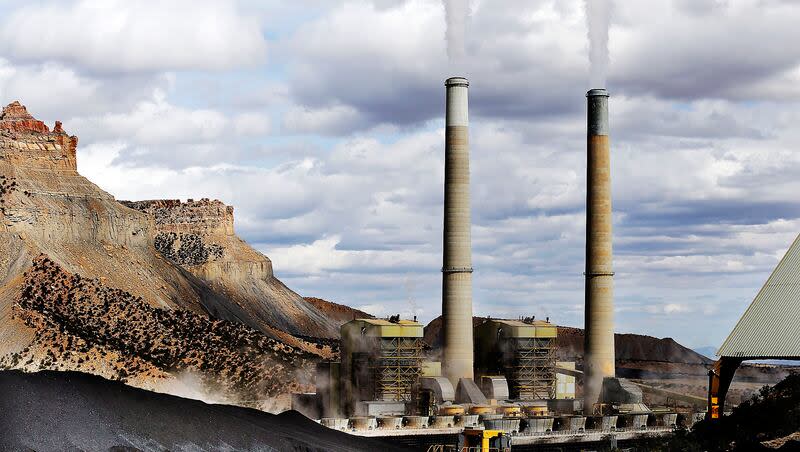Utah lawmakers embrace ‘energy security’ in multiple bills

In a span of less than two years, the state of California experienced more than 50,000 incidences of total blackouts of energy, impacting 51 million customers. The U.S. Department of Energy estimates that yearly power outages cost the United States $150 billion, and the number of outages are on the rise.
This analysis by BloomEnergy points to an aging power grid ill-equipped to deal with climate change and complex machinations in play when demand outpaces supply.
Conservative Utah lawmakers strongly emphasized they don’t want to be California, Oregon or Washington when it comes to securing the integrity of the power grid that serves Beehive State ratepayers, pushing and passing significant measures they assert prioritizes keeping the lights on by hanging onto coal, despite regulatory and activist pressure.
To that end, the Legislature passed measures putting the Delta power plant operated by the Intermountain Power Agency under stricter state control that could block the decommissioning of the coal-fired power units at the facility as it moves to natural gas to serve its customer base of which 98% is comprised of California consumers.
SB161 passed Thursday and would offer up the infrastructure at fair market value or best offer.
Because of mandatory clean energy standards approved by California, it will no longer consume coal and hopes to move to a blend of 70% natural gas and 30% hydrogen at some point.
Conservative lawmakers say it is foolhardy and fiscally imprudent to let Utah infrastructure on Utah land — in Millard County — be razed when the energy could be used here. There is also the water consumption that is at issue in a state plagued by water scarcity concerns.
Democrats and clean energy advocates blasted the passage of the bill, which awaits the governor’s signature, asserting Utah’s dominant party is intent on clinging to a dirty, increasingly obsolete source of energy that is destined to fail.
Critics argued the state, with its pollution concerns, should pursue sources of clean energy with its technological advances that are rapidly evolving and costs that are on the decrease that in the end will be cheaper than operating aging infrastructure.
It is a bet the GOP is taking that will make losers out of Utah and its ratepayers, argued Rep. Joel Briscoe, D-Salt Lake City.
But Rep. Carl Albrecht, R-Richfield, said the state is not opposed to turning to alternative “clean energy” resources that include geothermal and advanced nuclear, but those are not yet viable because they have not been brought to utility scale. Utah power providers, in fact, who had hoped to invest in advanced nuclear as a baseload supply of energy saw their hopes vanish when a project destined to be sited at the Idaho National Laboratory was derailed due to escalating costs.
The fight over energy
State lawmakers also approved SB224 after an hour of debate on the House floor Friday and despite condemnation from Democrats in that body.
Again, Albrecht was not deterred in his insistence that Utah needs to preserve its energy reliability on coal until a suitable alternative comes along that can provide affordable, dependable energy that won’t subject the state to the same sort of rolling brownouts and blackouts experienced by other states.
An analysis by the U.S. Energy Information Administration released in 2023 put Utah’s electricity rates at among the lowest in the nation and Albrecht added that midwest power providers narrowly escaped capacity shortfalls last year because of delayed retirements of power plants.
“We’re all of the above state. Rocky Mountain buys a lot of solar and a lot of wind from a lot of people. And they buy geothermal. They have their own geothermal plant down by Milford. We have got to stay on this road that brought us to the lowest rates in the nation. Until we get over that bridge, where there’s something else that’s the next greatest generation source, whether that be small nuclear, or hydrogen — whatever that might be when that technology comes along and it’s affordable, reliable and dispatchable — this is what we have now.”
Western Resource Advocates said ratepayers will be blindsided by the bill.
“This is bad energy policy that shatters years of progress toward a clean and reliable energy grid and ties Utahns to a very risky fuel source,” said Sophie Hayes, Utah clean energy manager and senior attorney at WRA. “Utah has gone all in on coal in a way that fundamentally misunderstands how the grid works, dismantles important ratepayer protection, and ignores the very real threats to energy reliability and affordability posed by continued reliance on coal.”
Albrecht countered that other states will come knocking at Utah’s energy supply door — meaning coal — when they experience capacity shortfalls due to the intermittent nature of renewable energy as it sits now. And Utah ratepayers will make money, he argued.
The bill says the Public Service Commission must consider the risk when considering other energy resources that would supplant Utah coal, including the nature of its reliability as a dispatchable energy supply. Critics say that upends the regulatory oversight granted the commission, boxing it into a corner when it comes to making best decisions for ratepayers — and the future.
Utah lawmakers also passed HB215 by Rep. Colin Jack, R-St. George, to mandate a four-day grace period for rooftop solar customers who may ink a contract with a vendor without fully understanding the costs and the electrical provider’s role in the adoption of the clean energy. Complaints about the solar industry rank in the top 10 with the Utah Division of Consumer Protection and while lawmakers say there are good actors out there, consumers — especially the elderly — need more protection.

